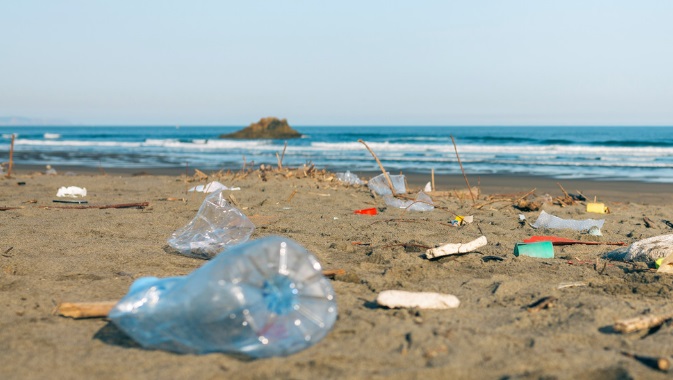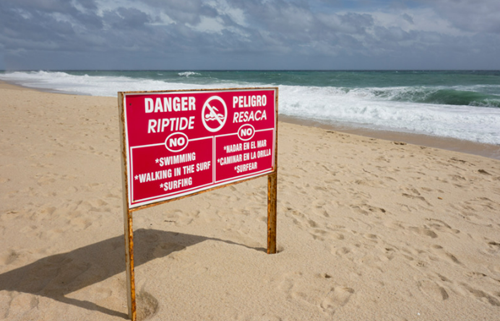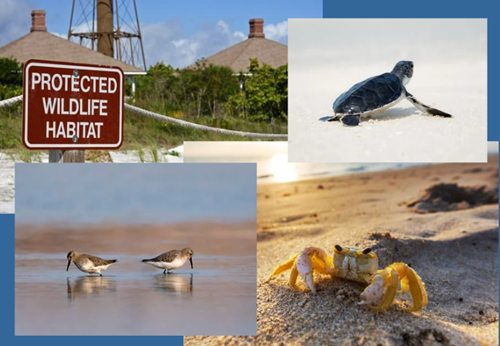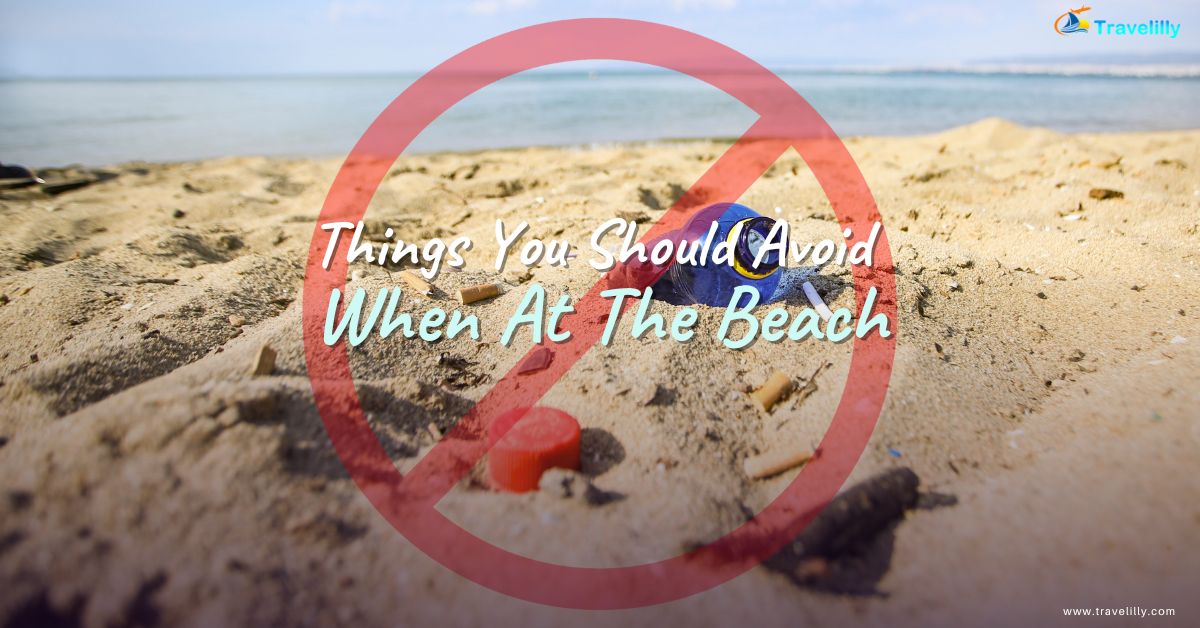The beach is a magical place—a soothing blend of waves, sun, and open skies. It offers a retreat from the routine and a chance to reconnect with nature. But while a day at the beach can be incredibly relaxing, it’s also essential to consider the impact of our actions on the coastal environment and fellow beachgoers. Knowing things you should avoid when at the beach is just as important as knowing how to be safe while on the beach. By making conscious choices, we can help keep these beautiful spaces pristine for everyone and protect the delicate marine ecosystems that thrive just beyond the shoreline.
This article covers key behaviors to avoid at the beach. From being mindful of your sunscreen choices to respecting local wildlife, these pointers aim to help everyone enjoy the beach responsibly. Let’s dive in and explore the top things to steer clear of on your next seaside adventure!
8 Things You Should Avoid When At The Beach
1. Avoid Harmful Sunscreen Chemicals: Opt for Reef-Safe Alternatives
Sunscreen is a beach essential, but certain chemicals in conventional sunscreens, such as oxybenzone and octinoxate, pose significant risks to marine life, especially coral reefs. These ingredients can cause coral bleaching, hinder coral growth, and disrupt the life cycles of marine species. Given that coral reefs support around 25% of marine species, even small actions can have large impacts.
To minimize harm, choose a reef-safe sunscreen that uses non-toxic ingredients like zinc oxide or titanium dioxide. Look for labels indicating “reef-safe” or “oxybenzone-free” to ensure you’re making a responsible choice. These sunscreens are better for sensitive marine environments and provide effective sun protection without compromising the beauty of underwater ecosystems.
2. Leave No Trace: Dispose of Waste Responsibly
Leaving litter on the beach is not only unsightly but also dangerous to marine and coastal wildlife. Items like plastic bottles, food wrappers, and cigarette butts can end up in the ocean, where they may be mistaken for food by sea creatures. Ingesting plastic waste can lead to starvation, malnutrition, and even death for marine animals.

Bring a reusable bag to collect your trash and ensure that every piece of waste finds its way to a proper disposal bin. Participating in local beach clean-up events is a great way to contribute to keeping coastal areas beautiful and safe. A cleaner beach not only benefits wildlife but also ensures a more pleasant experience for everyone who visits.
3. Respect Safety Warnings and Local Advisories
Beach safety advisories are there for a reason—they inform visitors of potential hazards like strong currents, jellyfish sightings, or other dangerous conditions. Lifeguards and local authorities issue these warnings to protect both locals and tourists from harm.

Pay close attention to the flag system at lifeguarded beaches, which often indicates water conditions:
- Green flags usually mean calm waters.
- Yellow flags signify moderate hazards.
- Red flags indicate dangerous conditions, often advising against swimming.
By heeding these warnings and refraining from swimming in unsafe conditions, you not only protect yourself but also respect the work of those who ensure the beach is a safe space.
4. Maintain Personal Boundaries and Respect Privacy
The beach is a public space, but personal boundaries still matter. Avoid intrusive behaviors like photographing strangers without their permission, especially in moments when people may feel vulnerable or exposed. A simple rule: if you wouldn’t want it done to you, don’t do it to others.
Exercise courtesy and empathy by respecting others’ privacy, keeping noise to a minimum, and giving people space to enjoy the beach as they wish. These small acts of kindness contribute to a welcoming environment where everyone can relax without feeling uncomfortable or objectified.
5. Avoid Disturbing Marine Life: Observe from a Distance
The ocean teems with life, from tiny crabs scurrying along the shore to majestic sea turtles gliding underwater. It may be tempting to get up close to these creatures, but doing so can harm them and disrupt their natural behaviors. Avoid touching, feeding, or attempting to ride or chase marine animals, as these actions can lead to stress, injury, or even death for some species.

Instead, observe marine life respectfully from a distance. This way, you can marvel at the beauty of nature without disturbing it. If you enjoy snorkeling or diving, remember that even well-intentioned gestures like feeding fish can disrupt the ecosystem and alter natural behaviors.
6. Don’t Remove Sand, Shells, or Marine Life from the Beach
Collecting seashells, sand, or rocks might seem harmless, but it can actually harm local ecosystems. Shells, for instance, serve as shelters for marine organisms, while sand dunes provide essential protection against erosion and storm surges. Removing these natural elements disrupts the ecosystem, robbing other beachgoers—and future generations—of the chance to enjoy them.
Instead, take photos to capture your memories and leave the natural elements in place. If you feel inspired by a particular shell or rock, use it as a creative subject for photography rather than taking it home.
7. Avoid Feeding Wildlife: It Does More Harm Than Good
Feeding seagulls, fish, or other beach-dwelling animals may seem like a fun way to interact with nature, but it can lead to a range of problems. Feeding animals encourages dependence on humans, alters natural foraging behaviors, and can even cause digestive problems for wildlife unaccustomed to human food.
Moreover, animals conditioned to seek food from humans can become aggressive or spread diseases. By refraining from feeding wildlife, you contribute to the health and safety of both animals and beachgoers.
8. Be Mindful of Your Sound Levels: Keep Noise to a Minimum
The beach is a place to unwind, and for many, the appeal lies in the peaceful ambiance of waves crashing and the breeze blowing. Blasting loud music or shouting disrupts the serene environment that most beach visitors come to enjoy. Excessive noise can also disturb wildlife and even drive animals away from their natural habitats.
Consider using headphones if you want to listen to music and keep conversations at a respectful volume. This courtesy allows everyone to enjoy the natural sounds of the beach and helps protect the peaceful atmosphere that makes coastal outings so special.
Leave Only Footprints Behind
Visiting the beach is a privilege and an opportunity to engage with nature in its most serene form. By making small adjustments to our behaviors—like choosing reef-safe sunscreen, responsibly disposing of waste, and respecting local wildlife—we can help protect these spaces for future generations. Every positive action counts and contributes to the greater effort of preserving our planet’s natural beauty.
Let’s commit to leaving only footprints behind and creating memories that honor the beach environment. When we prioritize respect, responsibility, and awareness, we ensure that every beach visit remains enjoyable and impactful—not just for ourselves but for everyone who comes after us.
Shop timeless retro style clothes only at Retro-stage.com
Retro-stage is a fashion-forward online platform committed to offering 1950s, 1940s, and 1920s dresses and accessories. Everything from twenties to fifties glamour clothes and dresses, hats, headbands, scarves, glasses, earrings, gloves, hand fans, and bags are here in Retro-stage. They are dedicated to offering timeless and authentic looks that are intricate and meet your retro-style needs to adapt to today’s fashion world. Achieve fabulous and stunning retro looks from head to toe without hassle only at Retro-stage.com.





